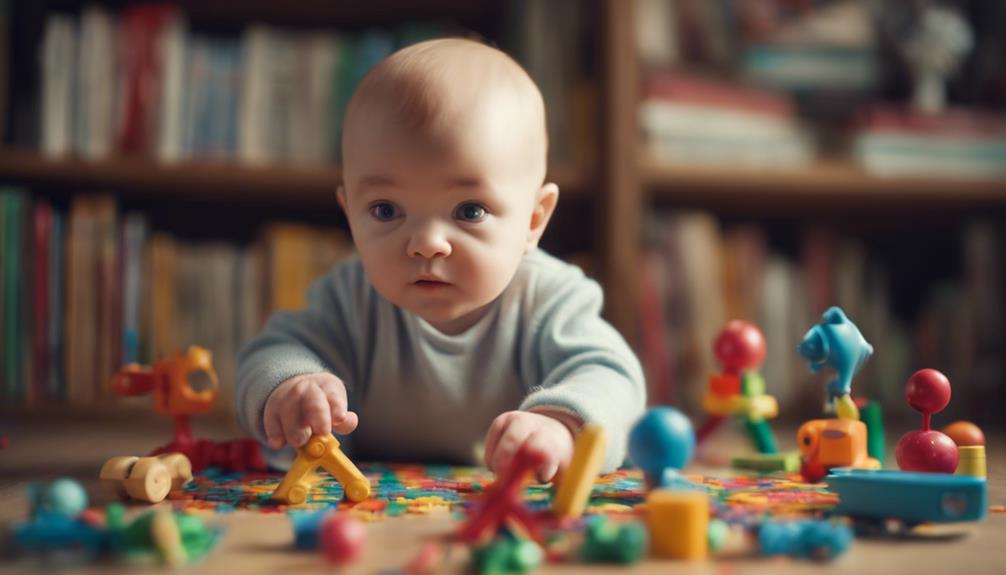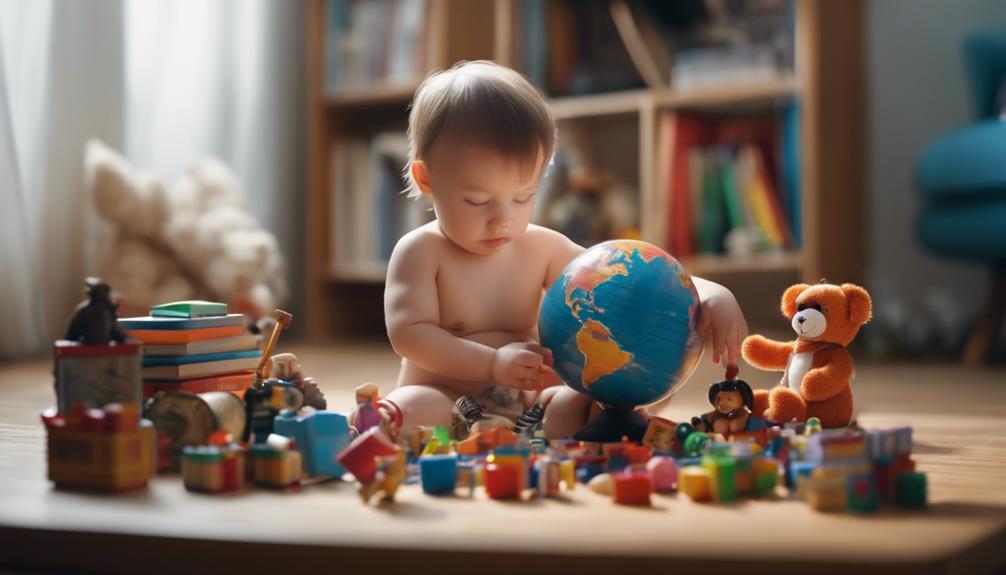Early signs of intelligence in babies include mimicking sounds, advanced language development, clear sentences by 10 months, high alertness, varied emotions, strong social skills, and forming deep connections. Achieving milestones like sitting up at 3 months, clear sentences at 10 months, and early crawling or walking also indicate cognitive abilities. Independent behavior, problem-solving, curiosity, memory retention, reduced sleep needs, and imaginative play further showcase intelligence. Observing these traits early on can provide insights into your baby’s cognitive potential.
Key Takeaways
- Mimicking sounds and attempting to talk early on.
- High alertness and responsiveness to the environment.
- Strong social interaction skills and forming deep connections.
- Advanced language development in infants.
- Wide range of emotions and clear sentences early.
Early Communication Skills
If you notice your baby mimicking sounds and attempting to talk early on, these could be key signs of high intelligence. Advanced language development in infants, such as speaking in clear sentences as early as 10 months old, is a strong indicator of cognitive skills and higher intelligence. Encouraging communication through activities like reading and talking can further enhance your baby's cognitive abilities.
Key communication skills, like mimicking sounds and attempting to form words, are vital milestones in a baby's development. When babies start to communicate clearly and effectively, it shows their ability to understand and express themselves, which are key components of intelligence. Clear and early communication milestones can be seen as a reflection of the baby's higher cognitive capabilities.
Emotional Intelligence

Intelligent babies often demonstrate a wide range of emotions early on, reflecting their strong emotional intelligence. These babies are highly alert, showing responsiveness to their environment. Their emotional intelligence shines through in their strong social interaction skills, allowing them to form deep connections with others.
You may notice that intelligent babies exhibit extreme focus on tasks that intrigue them, a sign of their emotional intelligence at work. Curiosity and even stubbornness in babies can also be indicators of their emotional intelligence, showing a determination to explore and understand their surroundings.
Early signs of emotional intelligence in babies go beyond just smiles and cries; they encompass a complex set of behaviors that reveal their ability to navigate the world emotionally. Watch for these subtle yet powerful cues in your baby's behavior to gain insights into their emotional intelligence from an early age.
Advanced Milestone Achievement
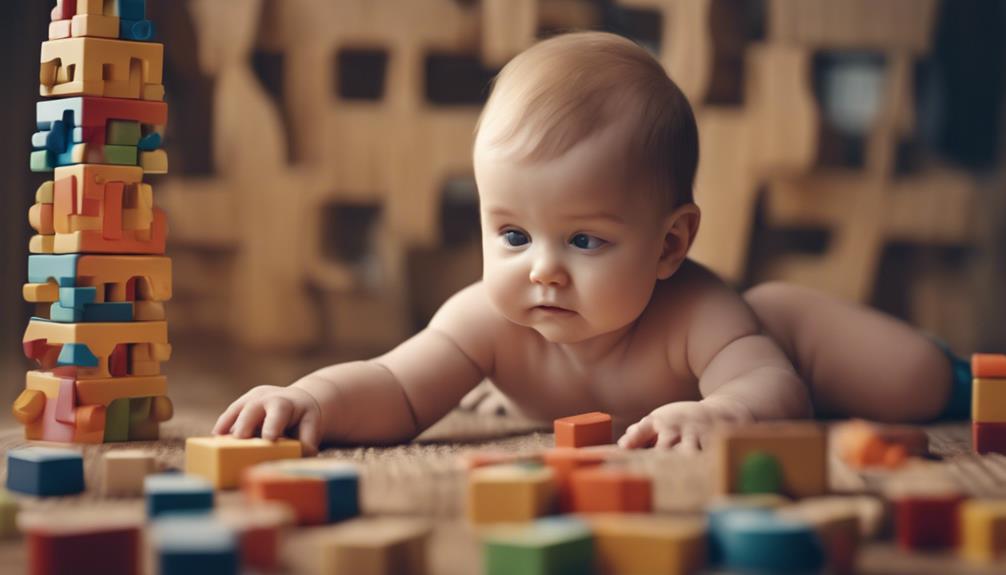
Achieving milestones ahead of schedule in infancy may be indicative of advanced cognitive capabilities. Babies who exhibit early signs of high intelligence often demonstrate remarkable abilities in their development.
Some key points to keep in mind regarding advanced milestone achievement in babies include:
- Early signs of gifted babies can be observed when they sit up alone at 3 months or form clear sentences at 10 months.
- Achieving milestones like crawling or walking ahead of schedule can suggest advanced cognitive abilities in infants.
- Fostering communication skills through activities such as reading and talking can further enhance a baby's intellectual growth.
These milestones are important indicators of a baby's potential intelligence level. Celebrating and acknowledging a baby's progress in achieving these milestones not only boosts their confidence but can also provide valuable insights into their cognitive and communication skills development.
Independent Behavior
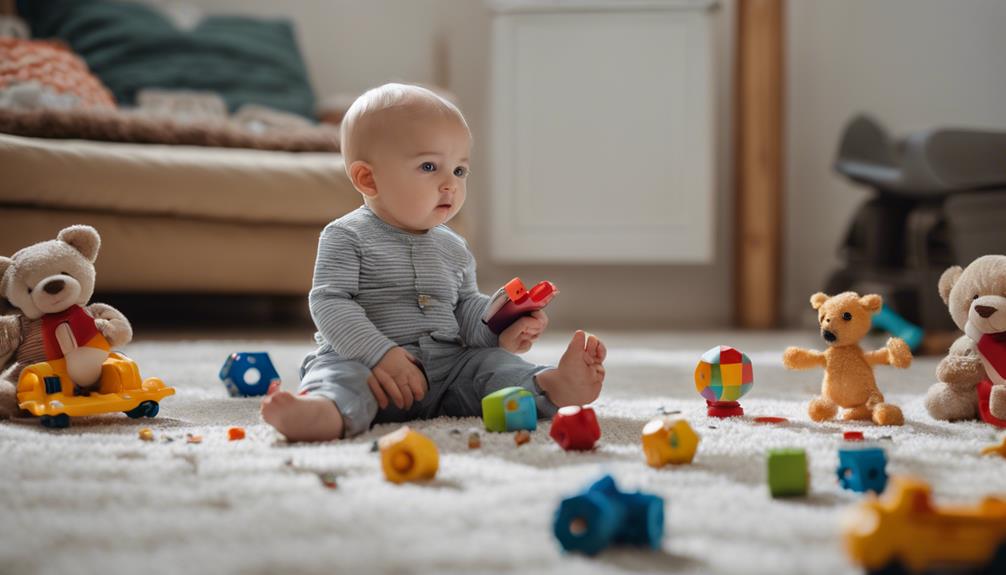
Observing independent behavior in babies can provide valuable insights into their cognitive development and potential intelligence level. Intelligent babies often exhibit a preference for solitary play, engaging in activities that stimulate their minds without constant interaction. This independence is a sign of advanced intelligence, as they actively explore and learn on their own.
By partaking in solitary play and exploration, intelligent babies challenge their cognitive abilities independently, fostering creativity and problem-solving skills from a young age. Encouraging this independent behavior can further enhance their cognitive development and nurture their innate intelligence.
Hence, if your baby shows a knack for exploring, engaging in solitary play, and tackling activities that require independent thinking, it could be an early indication of their advanced intelligence. Embracing and supporting their independent behavior can pave the way for a future marked by creativity, strong problem-solving abilities, and a love for exploration.
Strong Problem-Solving Abilities
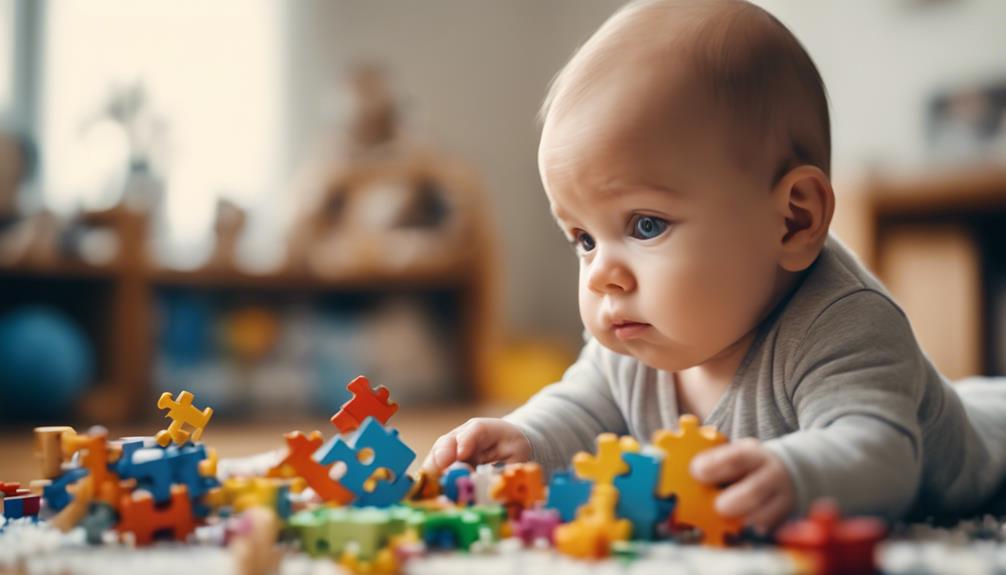
Developing strong problem-solving abilities in babies can greatly contribute to their cognitive growth and intelligence. Intelligent babies exhibit exceptional problem-solving skills from an early age, quickly understanding and overcoming challenges presented to them.
Observing babies finding creative solutions to obstacles is a clear sign of their problem-solving abilities. Encouraging problem-solving tasks can nurture and further develop a baby's intelligence. Babies with advanced cognitive development often display strong problem-solving skills, showcasing their ability to tackle various situations effectively.
Encouraging Challenges: Presenting babies with age-appropriate challenges can help stimulate their problem-solving abilities.
Creative Solutions: Observing babies coming up with unique and creative solutions to problems indicates their advanced cognitive development.
Nurturing Intelligence: Actively engaging with babies in problem-solving activities can encourage the growth of their cognitive abilities.
Exceptional Focus

How early can intelligent babies demonstrate exceptional focus?
Intelligent babies can exhibit remarkable focus on tasks even before reaching six months old. You may notice your baby engaging in activities such as playing with blocks or showing intense concentration while being read to. Encouraging activities that stimulate focus, like colorful floor puzzles, can help enhance their attention span further.
These early signs of advanced focus in babies are strong indicators of intelligence. By providing opportunities for your baby to concentrate on specific tasks, you can support the development of their ability to focus and enhance their cognitive abilities.
Paying attention to your baby's focus and encouraging activities that promote concentration can contribute to their overall intellectual growth. Keep an eye out for these signs of exceptional focus in your baby as they can provide valuable insights into their intelligence and cognitive development.
Curiosity and Exploration
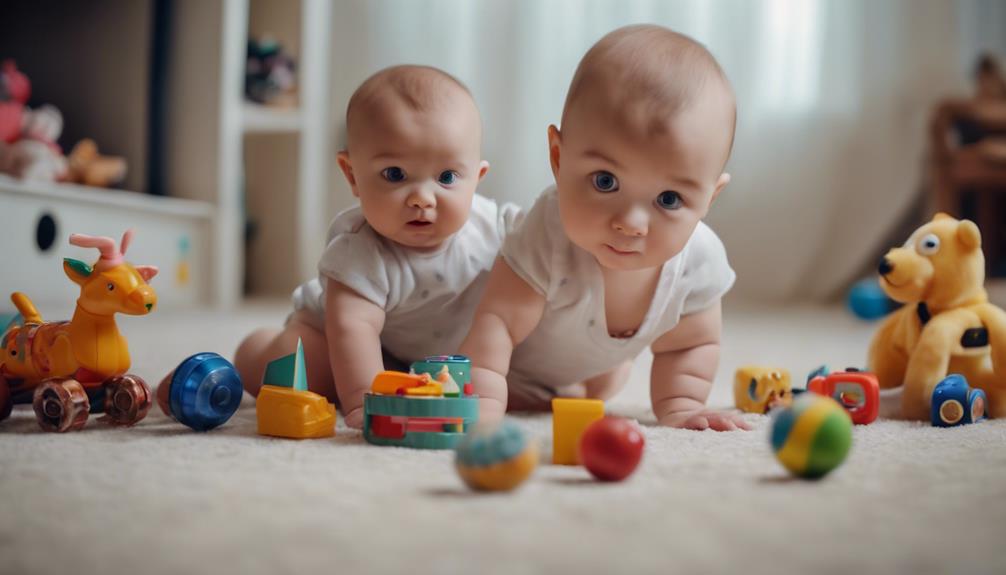
Intelligent babies display enthusiastic learning behaviors, constantly seeking new information and experiences to broaden their understanding of the world around them.
Their curiosity to discover drives them to ask questions and engage with their environment in a hands-on manner, promoting cognitive development and enhancing their overall intelligence.
Encouraging your baby's curiosity and exploration can set a strong foundation for their future learning journey, fostering a sense of wonder and a thirst for knowledge.
Active Learning Behaviors
Encouraging your baby's natural curiosity through exploration and active engagement with their environment can foster their intelligence and cognitive development.
Intelligent babies exhibit behaviors that signify their active learning approach:
- Constantly Exploring: Highly intelligent babies are always on the move, exploring their surroundings with a sense of wonder and excitement.
- Engaging in Problem-Solving: They show a knack for questioning and problem-solving, trying different approaches to understand how things work.
- Seeking Challenges: Intelligent babies actively seek out challenges and new experiences, pushing themselves to learn and grow through exploration.
Eagerness to Discover
To further understand your baby's intelligence, observe their enthusiasm to discover through curiosity and exploration in their daily interactions. Highly intelligent babies exhibit a natural curiosity, constantly exploring their surroundings and seeking new information. They show a keen interest in discovering new objects, textures, and sounds right from an early age. Intelligent babies may ask complex questions that challenge adults, displaying an insatiable thirst for knowledge.
Encouraging their curiosity by providing educational tools and resources can support their learning journey. Stimulating their minds with interactive activities and opportunities for exploration helps nurture their natural curiosity.
Hands-On Exploration Habits
Highly curious babies actively engage with their surroundings through hands-on exploration, using their senses to learn about the world around them. This explorative behavior is a key indicator of their intellectual growth and cognitive development. Their desire for knowledge and understanding drives them to interact with objects, textures, and sounds in their environment, paving the way for a deeper comprehension of the world.
Here are some key aspects of hands-on exploration habits in intelligent babies:
- Active Exploration: Intelligent babies are constantly on the move, touching, grasping, and manipulating objects to satisfy their curiosity.
- Curiosity Levels: Their insatiable curiosity leads them to investigate new stimuli and environments with enthusiasm.
- Intellectual Growth: Through hands-on exploration, babies develop essential cognitive skills, laying a strong foundation for future learning and problem-solving abilities.
Encouraging and nurturing this innate curiosity can greatly contribute to their overall development and future success.
Memory Retention
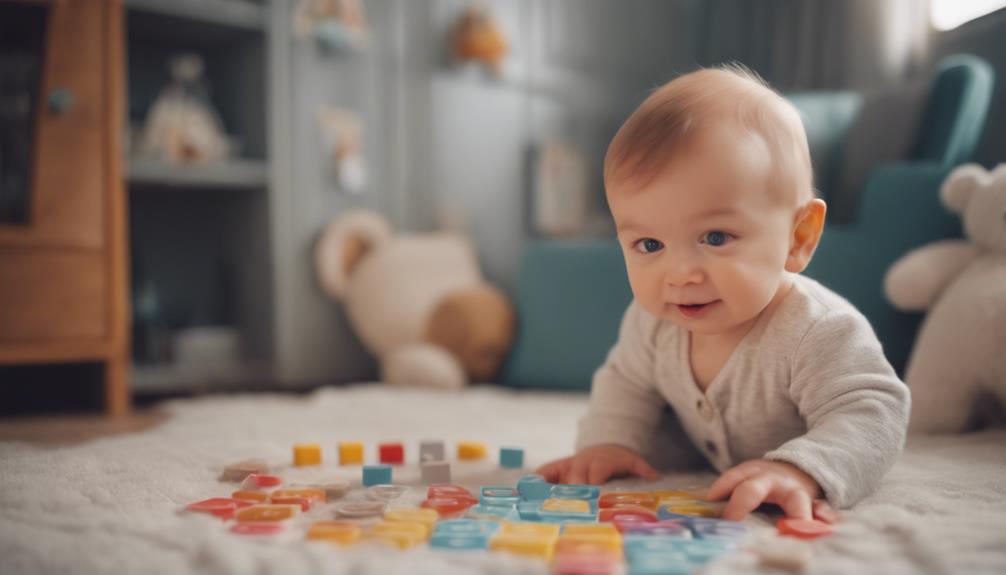
From a young age, intelligent babies exhibit exceptional memory retention, effortlessly recalling faces, voices, and experiences. Their ability to remember past events, routines, and preferences is a pivotal indicator of cognitive development and potential intelligence in infants. Babies with high intelligence often showcase remarkable memory skills by recognizing patterns and sequences, highlighting their advanced cognitive abilities.
Encouraging memory games and activities can further enhance a baby's memory retention and overall cognitive development.
Early memory retention in babies is a vital early clue to their intellectual capabilities. By engaging in activities that stimulate memory, such as playing memory games or encouraging repetition of familiar tasks, parents and caregivers can support the enhancement of a baby's memory retention skills. These memory-enhancing activities not only contribute to cognitive development but also lay a strong foundation for future learning and problem-solving abilities in intelligent babies.
Reduced Sleep Needs

Intelligent babies may exhibit a reduced need for sleep compared to their peers, functioning well on fewer hours. Studies have shown a correlation between high IQ levels and babies who sleep less.
If your baby shows advanced cognitive abilities, alertness, and continues hitting developmental milestones despite getting less sleep, it could be an early indicator of intelligence.
Monitoring your baby's overall well-being is vital when considering their sleep patterns as a potential marker of intelligence.
- Reduced sleep needs in infants may be linked to high IQ levels.
- Alertness and hitting milestones despite less sleep can be signs of advanced cognitive abilities.
- Monitoring overall well-being is essential when observing your baby's sleep patterns for intelligence indicators.
Imaginative Play

Engaging in imaginative play is a key characteristic observed in intelligent babies. These babies exhibit creative thinking by crafting elaborate scenarios and storylines during playtime. By inventing new games and repurposing objects in unconventional ways, they showcase their creativity and problem-solving skills. Imaginative play not only entertains but also contributes immensely to cognitive development in intelligent babies.
Parents play an important role in fostering imaginative play by providing open-ended toys and props that encourage creativity. By observing your baby engage in imaginative play, you can gain valuable insights into their intelligence and creative thinking abilities.
Pay attention to how they use objects, create make-believe worlds, and solve pretend problems – these are all early clues to your baby's intelligence.
Frequently Asked Questions
How to Tell if Baby Has High Iq?
Wondering if your baby has a high IQ? Look for early developmental milestones like sitting up early or forming clear sentences. Watch for exceptional problem-solving skills, curiosity, independence, and physical attributes like high birth weight and height.
How Do I Know if My Baby Is Gifted or Just Smart?
You can tell if your baby is gifted or just smart by observing their problem-solving skills, curiosity, memory retention, language abilities, sensory sensitivity, emotional intelligence, focus, and social behaviors. Pay attention to these traits for clues.
At What Age Can You Tell if a Child Is Intelligent?
By around 14 months, you may notice signs of intelligence in a child. Early indicators include surpassing developmental milestones, sharp problem-solving abilities, remarkable memory, intense curiosity, and advanced communication skills. These can hint at giftedness.
How to Check Baby IQ Level?
To check your baby's IQ level, observe early achievement of milestones like sitting up at 3 months. Notice advanced focus abilities, problem-solving skills, curiosity, and alertness. Set challenges, offer support, and engage in activities that encourage learning and development.
Conclusion
To sum up, early signs of intelligence in babies can be observed through their communication skills, emotional intelligence, milestone achievements, problem-solving abilities, curiosity, memory retention, independent behavior, reduced sleep needs, and imaginative play.
Just like a budding flower opening up to the world, these clues can give parents a glimpse into their child's potential for growth and learning.
Keep nurturing and encouraging their development, and watch as their intelligence blossoms like a beautiful garden in full bloom.

